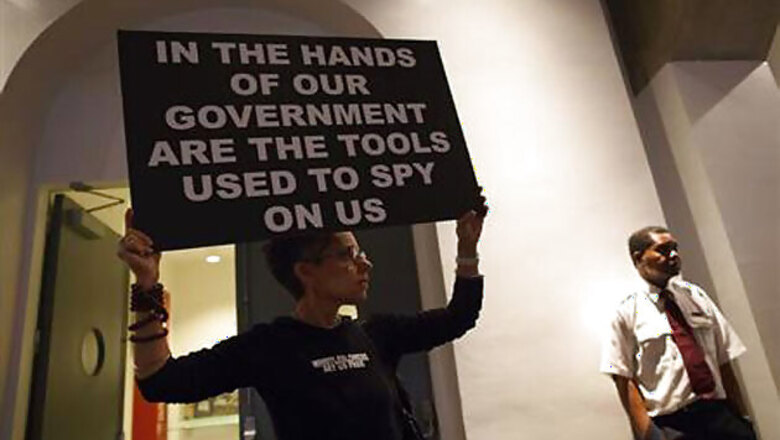
views
U.S. government auditors discovered four years ago that a select group of private contractors conducting background checks for high-security jobs were not doing enough to ensure the quality of their investigations.
Some investigators hired by the companies were not adequately trained or closely supervised, and the background reports they turned over to agencies for hundreds of thousands of prospective employees had missing information that could lead to risky hiring, the inspector general for the Office of Personnel Management said in a 2010 report that got little attention.
Now, as Congress focuses on how former Booz Allen Hamilton (BAH.N) systems administrator Edward Snowden gained access to National Security Agency secrets while working at a facility in Hawaii, the report's findings are drawing new attention. Some lawmakers are calling for a full review of how security clearances are done.
Snowden is facing espionage charges after leaking details about secret U.S. surveillance programs to the media. He flew to Moscow from Hong Kong on Sunday and, according to Russian President Vladimir Putin, on Tuesday he was in the transit area of a Moscow airport.
At a hearing last week, Senator Claire McCaskill, a Missouri Democrat on a contracting oversight panel of the Senate Homeland Security Committee, cited an ongoing investigation into USIS, the contractor that conducted the most recent security review of Snowden.
"It is a reminder that background investigations can have real consequences for our national security," McCaskill said.
Questions have been raised about whether Snowden misstated his educational credentials. Hiring screeners at Booz Allen Hamilton found possible discrepancies in a resume submitted by Snowden, but the company still employed him, a source with detailed knowledge of the matter said last week.
Snowden also would have had to undergo a polygraph exam administered by the NSA, a senior government official said on condition of anonymity.
USIS is one of three companies now doing background checks under contracts worth up to $2.5 billion with the government's Office of Personnel Management.
USIS declined to comment for this story beyond a statement issued last week in which it said it had cooperated with the OPM inspector general's investigation and had no comment about Snowden's background check.
Screening prospective employees is a challenge because of the large number of jobs now requiring secret or top-secret clearances.
As of October 2012, 4.9 million U.S. workers had some sort of federal security clearance. There were 3.9 million background investigations done in fiscal 2012, some by the OPM's Federal Investigative Services unit and others by the three contractors with oversight by the OPM. It is unclear how many each does.
The OPM's Federal Investigative Services (FIS) defended the quality of background investigations.
"FIS investigative personnel are held to the highest standards of ethical and professional conduct in their positions of public trust and national security," Merton Miller, associate director of FIS, said in a statement. "Misconduct rarely occurs."
The 2010 report found problems with procedures and safeguards used by all three private contractors - USIS, KeyPoint Government Solutions and CACI International Inc (CACI.N).
All three companies have had investigators who were found to have done substandard work in background checks, which involve pulling records and interviewing associates of a job seeker.
"USIS, Kroll (KeyPoint) and CACI have all employed background investigators who have been convicted of fabrication," Susan Ruge, associate counsel at the OPM's inspector general's office said.
The U.S. Attorney in the District of Columbia has prosecuted 18 cases since 2006 - 11 of them federal employees and seven who worked for the private companies, according to OPM Inspector General Patrick McFarland in testimony to Congress last week. The penalties for the crimes have ranged from prison time to house arrest.
CACI and KeyPoint declined to comment.
Some experts said it made no difference whether the background investigations were done by contractors or by government employees.
Companies are "using basically the same kinds of people" as the government, said Daniel Schwartz, a former NSA general counsel. "They're former agents or retired agents."
The Government Accountability Office said the fiscal 2012 base price for a "top-secret" clearance investigation conducted by OPM was $4,005 while the base price of a less sensitive "secret" clearance was $260.
Those conducting the background checks may be inexperienced, and may be pushed to work quickly, said Schwartz.
"The real problem in this process is that it is grossly understaffed," said Schwartz, now with the law firm Bryan Cave. "There are not enough good staffers. On the clearance side, it's a huge problem."
USIS, which has 2,300 investigators, is the oldest and largest of the three companies. It was created in 1996 when the government decided to partially privatize the work to achieve savings estimated at the time to be between $60 million and $120 million per year.
USIS is owned by a larger investigative company called Altegrity AGRTY.UL, which in turn is principally owned by private equity firm Providence Equity Partners.
KeyPoint started in 2000 as Kroll Government Services, which did consulting and investigations. Veritas Capital bought Kroll in 2009 and changed its name.
It has 2000 investigators and works for more than 120 federal agencies, including OPM, Immigration and Customs Enforcement, Customs and Border Protection and the Transportation Security Administration, according to the company's web site.
Defense contractor CACI, a technology company, began doing federal background checks in 2004. It was criticized for the translators and other personnel that it provided to the U.S.-run Abu Ghraib prison in Iraq.




















Comments
0 comment